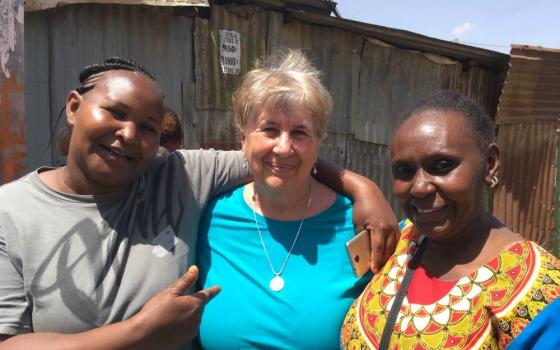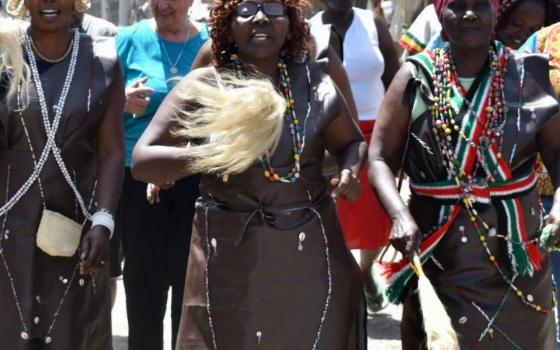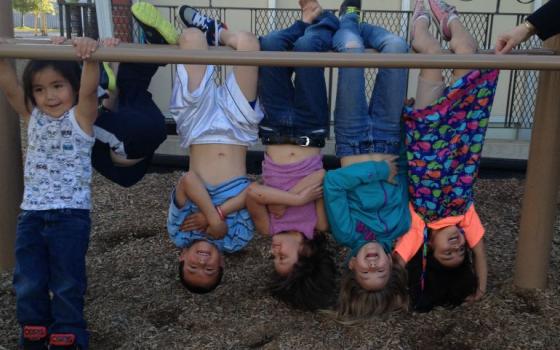The sound was deafening as we walked the litter-strewn paths of the Matombe slums in Nairobi. At least a hundred men were hammering at the same time, creating kitchen utensils out of discarded oil drums while children ran barefoot back and forth among the vendors. We were visiting some of the recipients of small loans from Jamii Bora/Yawezekana, a microfinancing organization for which we help to provide funding.
The "we" is Microfinancing Partners in Africa (MPA) an organization founded by O'Fallon Precious Blood Sister Toni Temporiti to provide additional funds for successful microfinancing projects in Kenya, Tanzania and Uganda. I serve on the Religious Advisory Board of MPA and was visiting some of our projects. This was my fifth trip to Africa, and I was accompanied by other staff and board members of the financing partnership.
Prior to visiting the projects in Kenya, we had spent more than a week visiting projects in Uganda and Tanzania. The poverty in both those countries is great also, but the projects we work with there are in rural areas, so there was natural beauty all around us. In the Nairobi slums, there is no natural beauty. There is noise and mud and poverty everywhere. Yet in the midst of the cacophony of sounds and the smells, were people eager to share with us the progress they had made since receiving a small loan. One woman proudly invited us into her shop to show us the pots and pans and utensils she was selling. It was really nothing more than a hole in the wall, but to Ella it represented a future for herself and her children now that she can put food on the table and send her children to school.
Two residents, Celestine and Wangari, appointed themselves to be my guides through City Cartōn slum, so called because the dwellings were originally constructed with cardboard boxes. Now the structures are made with the metal sides of oil barrels. To our eyes, it still looked like a slum, but to the people living there it is home, and they are proud of their accomplishments. My guides walked me in and out between the little shops and homes relating how improved their lives were now that they had a steady source of income. Again, they emphasized that their children were in school. This was a theme repeated over and over in our travels in each country. No parent talked of their accomplishments without talking about their children and the brighter future that awaited them because they were receiving an education.
As we were walking through City Cartōn, a group of borrowers came down the road singing and dancing and invited us to join in the parade. We were led to a house where an impromptu meeting was held to give loan participants the opportunity to tell their stories. One woman shared how she used her loan to buy a large thermos so that each day she would make coffee and take it to the streets to sell. She related that her business was doing well and she had hopes of buying several more thermoses and hiring other women to reach a larger population. Another had opened a stall with fresh local produce. Yet another had used her loan to buy some jewelry-making supplies and had started her small business with a jewelry stall. It is amazing to see how such small loans lead to such grand dreams!
Pope Francis' apostolic exhortation Guadete et Exsultate calls us to consider the Beatitudes as our "Christian Identity Card." The people I met in the slums of Nairobi challenge me every time I visit. The Beatitude "Blessed are the poor in spirit for theirs is the kingdom of God" is exemplified so clearly in their lives. Yes, they live in the midst of great physical poverty, but it is their poverty of spirit which shines forth so clearly. They live with a personal simplicity and sense of sufficiency, grateful for the little that they have. Their lives are extremely difficult and the obstacles they have to overcome appear to me insurmountable, yet they welcome us with open arms and thank us over and over for all we have done for them.
These women do not realize how much they have done for me. They make me stop and reflect on all that I have been given, but even more I realize that the choices I make in my everyday life do, in fact, affect so many others. I find myself asking if I truly understand the difference between want and need and how am I being challenged to live with less. Poverty of spirit, Cynthia Bourgeault says, "designates an inner attitude of receptivity and openness; one is blessed by it because only in this state is it possible to receive anything." I pray daily that we can change the systems that allow such extreme poverty to exist, but I also pray that I may have that inner attitude of receptivity and openness I see in the lives of my Kenyan friends.
[Caroljean Willie is a Sister of Charity of Cincinnati who has a Ph.D. in Multicultural Education. She has extensive experience working cross-culturally throughout the United States, the Caribbean and Latin America.]



